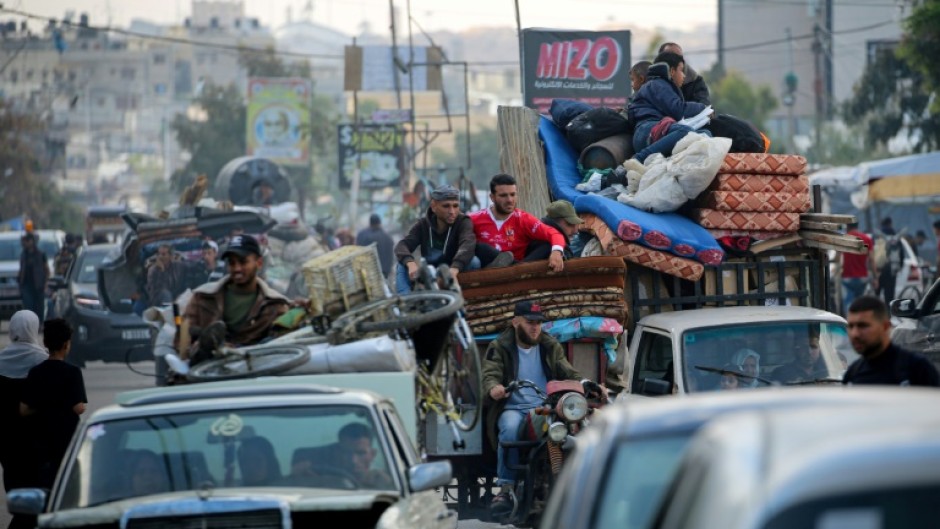Israel sent tanks into Rafah in southern Gaza, seizing control of the border crossing with Egypt on Tuesday, an operation the United Nations said denied it access to the key humanitarian passage.
The military's thrust into the eastern sector of the city packed with displaced civilians came a day after Israel warned Palestinians in the area to evacuate ahead of a long-threatened ground operation.
Army footage showed tanks flying the Israeli flag taking "operational control" of the Palestinian side of the border crossing, it said, in a deployment that had a "very limited scope against very specific targets".
UN humanitarian office spokesman Jens Laerke said Israel had denied it access to both Rafah and Kerem Shalom -- the other main Gaza aid crossing, on the border with Israel -- with only "one day of fuel available" inside the besieged territory.
Unless fuel was allowed in, "it would be a very effective way of putting the humanitarian operation in its grave", he warned.
Overnight, heavy bombardments rocked Rafah, an AFP correspondent reported. The Kuwaiti hospital said 23 people were killed and the Najjar hospital said another four people were killed.
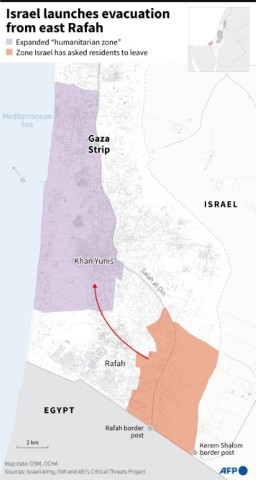
Later, Hamas's armed wing said it fired rockets at Israeli troops at Kerem Shalom, two days after four Israeli soldiers were killed in an attack it also claimed.
The Israeli army alleged the latest attack was launched from Rafah.
The war in the Gaza Strip was sparked by Hamas's unprecedented October 7 attack on Israel, which resulted in the deaths of more than 1,170 people, mostly civilians, according to an AFP tally of Israeli official figures.
Vowing to destroy Hamas, Israel launched a retaliatory offensive that has killed at least 34,789 people in Gaza, mostly women and children, according to the Hamas-run territory's health ministry.
Egypt, which has a peace treaty with Israel, and Qatar, a US ally that is also home to Hamas leaders, have taken the lead in the ceasefire negotiations.
- 'Permanent ceasefire' -
Hamas said on Monday night it had informed Egypt and Qatar of its "approval of their proposal regarding a ceasefire" in the conflict, prompting cheering crowds to take to the streets of Rafah.

The office of Israeli Prime Minister Benjamin Netanyahu said the proposal was "far from Israel's essential demands", but the government would send negotiators for talks "to exhaust the potential for arriving at an agreement".
In the meantime, it added, "Israel is continuing the operation in Rafah to exert military pressure on Hamas in order to advance the release of our hostages and the other objectives of the war".
Close Israeli ally the United States said it was "reviewing" the Hamas response.
Hamas member Khalil al-Hayya told the Qatar-based Al Jazeera news channel that the proposal agreed to by Hamas involved a three-phase truce.

It included a complete Israeli withdrawal from Gaza, the return of Palestinians displaced by the war and a hostage-prisoner exchange, with the goal of a "permanent ceasefire", he said.
Qatar said it was sending a delegation to Cairo on Tuesday morning to resume negotiations in the "hope that the talks will culminate in reaching an agreement for an immediate and permanent ceasefire in the Gaza Strip".
A senior Hamas official, speaking to AFP on condition of anonymity, said Israel must now decide whether it accepts or "obstructs" a truce.
- International alarm -
International alarm has been steadily building about the consequences of an Israeli ground invasion of Rafah, where the United Nations says 1.4 million people are sheltering.
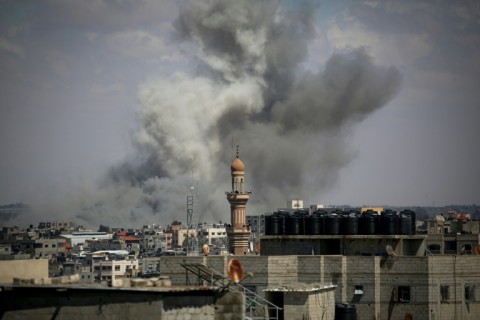
EU foreign policy chief Josep Borrell expressed concern that an attack was started on Rafah despite warnings from the European Union and the United States.
"I am afraid that this is going to cause again a lot of casualties, civilian casualties," he said.
Egypt's foreign ministry warned of "grave humanitarian risks" for those sheltering in Rafah and urged Israel to "exercise the utmost restraint".
In a conversation with Netanyahu on Monday, US President Joe Biden restated "his clear position" opposing an invasion of the city, the White House said.
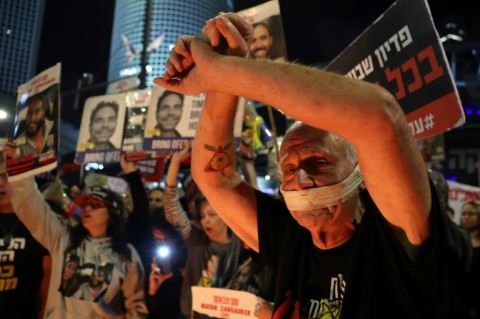
Netanyahu has vowed to eventually send ground troops into Rafah regardless of any truce, saying it needs to root out Hamas's remaining forces to prevent a repeat of the bloody October 7 attacks.
Militants who carried out the October 7 attack also abducted 250 hostages, of whom Israel estimates 128 remain in Gaza, including 35 the military says are dead.
The Hostages and Missing Families Forum said in a statement after Hamas's announcement Monday that "now is the time for all that are involved to fulfil their commitment and turn this opportunity into a deal for the return of all the hostages".
- 'Where can we go?' -
Hamas said Israel was planning a large-scale offensive "without regard for the ongoing humanitarian catastrophe" in Gaza or for the fate of the hostages held in the Hamas-run territory.
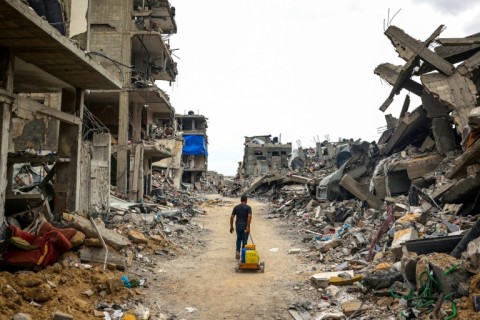
"The Israeli occupation deliberately exacerbates the humanitarian situation by closing the Rafah and Kerem (Shalom) crossings," the Hamas government's media office said.
Israel said its "limited" and temporary Rafah evacuation order aimed "to get people out of harm's way".
The Palestinian Red Crescent reported "thousands" of Gazans leaving the city's east.
Israel's military told those in eastern Rafah to head for the "expanded humanitarian area" at Al-Mawasi on the coast.
But aid groups said Al-Mawasi was not ready for such an influx.
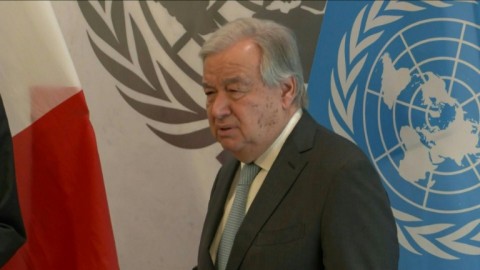
The Red Crescent said the designated evacuation zone hosts around 250,000 people, many of them already uprooted from elsewhere.
Palestinian Abdul Rahman Abu Jazar, 36, said the area "does not have enough room for us to make tents" because it is already full.
"Where can we go?" he asked.


